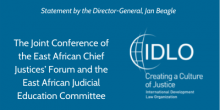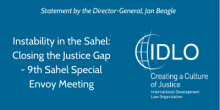Hague Setting for Wide-Ranging Rule of Law Debate
The rule of law is emerging as one of the most pressing issues of this century. It is a cornerstone of peace, security, justice and development.


Efficient, equitable and accessible justice systems are the lifeblood of the rule of law. For many years, building judicial capacity in the developing world was IDLO's sole area of intervention.
Today, while our mission and expertise has greatly expanded, we remain faithful to that early purpose. Building capacity in the judiciary is still the bulk of what we do, and what we are most recognized for. We do this in a variety of legal systems and traditions, working with local and international partners, with a strong emphasis on transition societies.
In the words of Kyrgyz Supreme Court Chair and IDLO interlocutor Feruza Z. Djumasheva, "Without successful judicial reforms, there will be no economic or social reform."
The rule of law is emerging as one of the most pressing issues of this century. It is a cornerstone of peace, security, justice and development.



Statement by the Director-General, Jan Beagle at the Joint Conference of the East African Chief Justices’ Forum and the East African Judicial Education Committee
Honourable Chief Justices,
Members of the East African Judiciaries,
Distinguished Guests,

EVENT | 10-12 May | Kigali, Rwanda

The United States Agency for International Development (USAID) has granted IDLO a prestigious Digital Development Award for its support to the judiciary in the Kyrgyz Republic.

Lack of good governance and the rule of law are one of the most pressing problems confronting modern Somalia on its path towards stability and reconstruction. While there have been signs of progress, the absence of robust and competent institutions has contributed to a climate of insecurity and impunity. Several assessments of the justice system in Somalia have found that judges and prosecutors lack of adequate skills to effectively administer criminal trials in line with Somali laws and procedures, particularly with respect to safeguarding the rights of the accused.
Instability in the Sahel: Closing the Justice Gap - 9th Sahel Special Envoy Meeting
Excellencies,
Distinguished guests,
Colleagues and friends,






|
Policy Statements
|